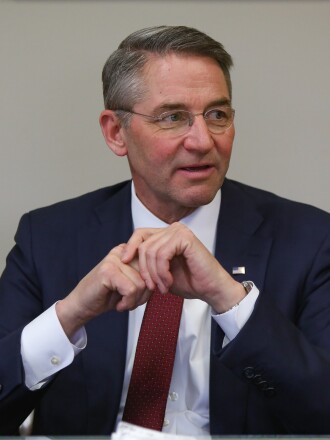BISMARCK — People who sell vaping products in North Dakota are sounding the alarm bells about an amendment tucked into Attorney General Drew Wrigley's budget, which they say would dramatically limit the number of products available to shoppers in North Dakota. They also say that the amendment has been crafted in such a way as to cut off competition to vaping products made by certain big tobacco companies.
But before we get to that, some back story.
The regulation of electronic smoking devices (as vapes are called in legislative parlance) is somewhat of an odd position.
During his term in office, President Joe Biden's administration sought to crack down on vaping, most notably through a ban on flavored vaping. Those regulations were challenged in the courts, and earlier this month, the U.S. Supreme Court ruled in favor of them, finding that they were lawfully constituted.
However, what the court essentially upheld was the Food and Drug Administration's authority to make those regulations. Or not make them, as the case may be. I'm sure I don't need to tell you that Biden is no longer president. Donald Trump is currently in office, and he's promised to "save flavored vapes."
The way things work now, vape products are legal to sell as long as they have an application pending with the FDA. Until the federal government instructs these companies to cease selling, they are free to market their products. But an amendment brought by Rep. Mike Nathe to House Bill 1003, which is the budget for the attorney general's office, would create an "electronic smoking device registry." Nathe introduced his amendment on Feb. 13.
Only vape products on the registry could be sold in North Dakota, and those products could only qualify for the registry in one of three ways.
They have to have an approved application from the FDA. There are not many products — only 34, as I write this — that have that approval. Or they have to have a waiver from the federal government. Or they have to have been marketed in the United States before Aug. 8, 2016, and have applied to the FDA before Sept. 9, 2020.
Why those oddly specific dates? Alexandria Honeycutt, a lobbyist who works in Tennessee, which saw legislation similar to this proposed there, says it's to protect big tobacco companies whose products meet those dates.
ADVERTISEMENT
"They have some products that were filed for application during that time frame," she said. "They were trying to get their products in through that portion of the law."
Clark Erickson, the CEO of Petro Serve USA, which is one of the largest gas station and convenience store chains operating in North Dakota, called the language "predatory."
"That'll affect us a lot," he said, arguing that the language would only allow his stores to sell vape products from "big tobacco" as opposed to the smaller vape companies. "Why is it that they can go and get their products in, which don't sell that well. Certainly, they don't sell as well as our disposables. It's kind of predatory how they're doing that."
"I just don't think this is fair to us as retailers," he continued. "Vapes are cheaper. They're better margin. And frankly, the consumers want them."
"I would say the impact would be essentially 75% of the smoke shops and vape shops in North Dakota would be shut down within a year," John Stearns told me. He's with J&S Marketing, based in Valley City, and he says he supplies North Dakota's largest convenience stores and truck stops with vape products. "I have a lot of stores that I sell to that are dependent on these revenues," he told me.
Stearns says the dramatic policy will likely take many retailers by surprise. "This was brought on without people really knowing about it," he said, adding that when he told the highest-volume vape retailer in Fargo about the legislation, "He completely flipped out."
"I'm not interested in being a ringleader on this, but it's wrong, and it's going to impact a lot of people," Stearns said. "The convenience stores and the truck stops don't know about it. The smoke shops and vape shops don't know about it. It happened really late, and business owners in North Dakota have no idea about it."
ADVERTISEMENT
Honeycutt said the problem could be fixed by adding an additional category to the law that would allow products that have consumable elements — the vape juice, essentially — that are made in the United States under the regulatory authority of the FDA.
Lacee Anderson, a lobbyist working for one of the impacted vape companies, said she has just such an amendment ready to go, but wasn't able to present it to lawmakers this week.

When I reached Nathe about the amendment, he directed me to Wrigley. He said he's not "invested" in this issue one way or the other, but he expressed opposition to pulling his budget back into the committee process.
HB 1003 has emerged from a conference committee and is currently set for a floor vote.
"Our budget process has gone on for many, many months prior to the session. We have a budget that required an enormous amount of legislative and agency work. The Legislature has been very supportive of this office this session. We appreciate all the work they put in," Wrigley said.
"Now at the last moment when all of our budget work has been done, and the Legislature and the conference committee has worked so hard to get a really solid budget, the people who were present at some of the hearings who could have spoken up, they didn't do that," he continued.
"This idea, this registry, is not something we put in. It was brought to us by the industry. I haven't monitored it particularly closely," he added. "To me it's a matter of weighing the idea that the legislative process should be derailed by folks who didn't even stand up in front of a hearing to have their ideas and information tested. I certainly don't want to sound callous and say too little too late, but I am saying that's a matter that will have to be addressed another time."
ADVERTISEMENT
Wrigley said he's against relitigating his office's budget over these changes. "It's kind of a head-scratcher. I don't think it's an appropriate thing to be shoving in major substantive changes at the last minute into a document that has been majorly, thoroughly vetted."












